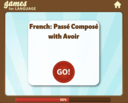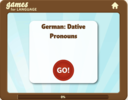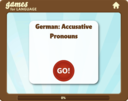
Italian Language Game: Day Week Month Year
Play Italian Language Game: Day Week Month Year. A fun interactive vocabulary game to practice some basics: the singular and plural of these masculine and feminine nouns. (Photo by Juliana Malta on unsplash.com)
The somewhat tricky part for English speakers is that the definite article "the" has several singular and plural forms in Italian. Using a game to practice these four nouns is a good start to internalizing the forms and their sounds.
Learning just the rules of a language pattern is sometimes too abstract and overwhelming. Practicing the sounds of specific examples, helps to create automatic responses. For example, you learn and then know that "il giorno - i giorni" is the regular masculine pattern for nouns starting with a consonant (with the exceptions noted below in the "Summary of Italian Articles").
So, when you encounter other masculine nouns starting with a consonant*, you automatically know what the pattern is: "il ragazzo - i ragazzi" (the boy - the boys), "il fratello - i fratelli" (the brother - the brothers), "il campo - i campi" (the field - the fields), etc. etc. (*However, please note the exceptions below which use "lo" and "gli" instead of "il" and "i"!)
Day Week Month Year
As you play, say the words OUT LOUD and imitate the speaker.
- il giorno - the day (m)
- i giorni - the days (m)
- il mese - the month (m)
- i mesi - the months (m)
- la settimana - the week (f)
- le settimane - the weeks (f)
- l'anno - the year (m)
- gli anni - the years (m)
Summary of Italian Definite Articles
il -for masculine singular nouns starting with a consonant
l' -for masculine singular nouns starting with a vowel
lo -for masculine singular nouns starting with s+consonant, z, y, gn, ps, pn
i -for masculine plural nouns starting with a consonant
gli -for masculine plural nouns starting with a vowel, s+consonant, x, z, y, gn, ps, pn
la -for feminine singular nouns starting with a consonant
l' -for feminine singular nouns starting with a vowel
le -for feminine plural nouns starting with a vowel or a consonant
For more easy games see also our post: 5 Easy Italian Language Games.
Or you can find ALL of them - over 60 by now - on the Italian Quick Language Games page.
If you like our Italian games, please SHARE them with your friends.
More than an Italian Language Game
With our Italian 1 course you'll practice Italian for FREE - with the story of a young man traveling through Italy. "The Story" and easy games will let you forget that you are actually learning Italian!
If you just play ONE lesson a day (we call them "Scenes") - and review the previous day's dialogue and Scene - you'll be amazed how much you'll have learned after 36 days!
And make sure to listen to the Podcast after each Level (six Scenes)

French Language Game: Passé Composé with Avoir
Quick French Language Game: Passé Composé with "Avoir"
Level: Elementary (A2)
Playing Time: 5 minutes
Learn and practice a few sentences using the Passé Composé tense with the auxiliary, or helping verb, "avoir". You use the French tense called Passé Composé for an action or event that was completed in the past.
To sharpen your pronunciation, say the French OUT LOUD right after or at the same time as the speaker.
You may want to look at the verb forms and sentences below before you begin.
Our games are a great way to learn or review basic conversational French.
Passé Composé with "avoir"
- j'ai parlé - I spoke
- tu as parlé - you spoke (familiar)
- il/elle a parlé - it/he/she spoke
- nous avons parlé - we spoke
- vous avez parlé - you spoke (formal/plural)
- ils/elles ont parlé - they spoke (m/f)
Sentences using the Helping Verb "avoir"
- Oui, j'ai parlé avec lui. - Yes, I spoke with him.
- Tu as lu le journal hier? - Did you(fam.) read the newspaper yesterday? [lire]
- Oui, il a dit ça. - Yes, he said that. [dire]
- Nous avons acheté une maison. - We bought a house. [acheter]
- Où avez-vous appris le français? - Where did you(form.) learn French? [apprendre]
- Ils ont fait une promenande. - They took a walk. [faire]
If you like our games, please SHARE us with your friends.
More Than a French Language Game
Remember: You can practice French online for FREE with our 36-Scene French 1 Travel-Story: "Daniel en France".
In it you'll learn and practice all the words, phrases and sentences you hear in the podcasts.
Just login HERE.
"The Story" and easy games will let you forget that you're actually learning French!
If you have any language questions - don't hesitate to contact us!
French Language Game: Avoir - Present Tense
Quick French Language Game: avoir (to have) - present tense
Level: Elementary (A2)
Playing time: 5 minutes
Play a quick French language game to learn and practice the present tense of "avoir". You'll also put together basic sentences and learn the meaning of 5 common idiomatic expressions.
To improve your pronunciation, always say the French OUT LOUD right after or at the same time as the speaker.
Before you start, you may want to look at the verb forms and sentences below.
These games are a great way to learn and review basic conversational French.
Play on a Computer or Tablet.
Present Tense of "avoir"
- j'ai - I have
- tu as - you have (familiar)
- il/elle a - it/he/she has
- nous avons - we have
- vous avez - you have (formal/plural)
- ils/elles ont - they have (m/f)
Sentences and Expressions using "avoir"
- Tu as ton passeport ? - Do you have your passport? (familiar)
- Nous avons ton adresse. - We have your(fam.) address.
- Il a le mot de passe. - He has the password.
- Oui, j'ai un portable. - Yes, I have a cell phone.
- Ils ont la clé. - They have the key.
- Avez-vous une carte de crédit ? - Do you have a credit card? (formal)
- J'ai vraiment faim. - I'm really hungry.
- J'ai besoin d'un mot de passe ? - Do I need a password?
- Ça a l'air bon. - That looks good.
- il y a - ... ago
- Il ya a plus de deux ans. - More than two years ago.
- il y a - there are
- Une "place" est un lieu où il y a souvent de marchés. - A square is a place where there often are markets.
If you like our games, please SHARE us with your friends.
More Than a French Language Game
Remember: You can practice French online for FREE with our 36-Scene French 1 Travel-Story: "Daniel en France".
In it you'll learn and practice all the words, phrases and sentences you hear in the podcasts.
Just login HERE.
"The Story" and easy games will let you forget that you're actually learning French!
If you have any language questions - don't hesitate to contact us!

German Language Game: Dative Pronouns
Quick German Language Game: Dative Pronouns
Level: Elementary (A2)
Playing Time: 4 minutes
Here you can play a quick and fun German Language Game to learn and practice German Dative Pronouns:
• mir (to me)
• dir (to you, familiar)
• ihm (to him)
• ihr (to her)
• uns (to us)
• euch (to you-all)
• ihnen /Ihnen (to them /to you, formal)
1. Review the dative pronouns with the Shootout Game.
2. Recall basic nouns with the Memory Game.
3. Put together simple sentences using dative pronouns with the Word Invader Game.
4. Choose the translation of sentences with the Deal No Deal Game.
If you feel that you have a good understanding of the Dative pronouns and want to test your German vocabulary, just play the game. Otherwise, read on and then play.
Nouns
der Schlüssel - the key (m)
der Stadtplan - the city map (m)
Note: These masculine nouns will come up as direct objects (accusative case):
den Schlüssel, den Stadtplan
die Handynummer - the cell phone number (f)
die Adresse - the address (f)
die Zeitung - the newspaper (f)
die Wohnung - the apartment (f)
Note: Feminine nouns have the same article as subjects and direct objects: "die X."
das Buch - the book (n)
das Foto - the photo (n)
Note: Neuter nouns have the same article as subjects and direct objects: "das X."
Verbs
geben - to give
[ich gebe, du gibst, er/sie gibt, wir geben, ihr gebt, sie/Sie geben]
zeigen - to show
[ich zeige, du zeigst, er/sie zeigt, wir zeigen, ihr zeigt, sie/Sie zeigen]
Other Key Vocabulary
Kann ich ... geben? - Can I ... give? [können]
Geben Sie doch ... - Do give ... [imperative, formal]
warum - why
sie wollen - they want [wollen]
If you like our games, please SHARE us with your friends.
More Than a German Language Game
Remember: You can learn and practice German online for FREE with our 36-Scene German 1 Story: "Michael in Deutschland" and our 72-Scene German 2 Mystery Story Sequel: "Blüten in Berlin?"
("Blüten" means blossoms in German - but you'll find out that it has another, darker meaning).
Just login HERE.
And, if you have any language questions - don't hesitate to contact us!

German Language Game: Accusative Pronouns
German Language Game - accusative pronouns
Level: Elementary (A2)
Playing Time: 4 minutes
Play a fun and quick German Language Game to learn and practice German Accusative Pronouns:
• mich (me)
• dich (you, familiar)
• ihn (him)
• sie (her)
• uns (us)
• euch (you-all)
• sie /Sie (them /you, formal)
1. Review the accusative pronouns with the Shootout Game.
2. Recall basic verbs that take the dative (a direct object).
3. Put together simple sentences using accusative pronouns with the Word Invader Game.
4. Choose the translation of sentences with the Deal No Deal Game.
If you understand accusative pronouns as direct objects and want to try out your German vocabulary, just play the game. Otherwise, read on below and then play.
Verbs with a Direct Object
sehen - to see
[ich sehe, du siehst, er/sie sieht, wir sehen, ihr seht, sie/Sie sehen]
kennen - to know, be acquainted with
[ich kenne, du kennst, er/sie kennt, wir kennen, ihr kennt, sie/Sie kennen]
suchen - to look for
[ich suche, du suchst, er/sie sucht, wir suchen, ihr sucht, sie/Sie suchen]
anrufen - to call (a *separable-prefix verb)
[ich rufe an, du rufst an, er/sie ruft an, wir rufen an, ihr ruft an, sie/Sie rufen an]
Separable Prefix Verbs
These are verbs that separate into two parts when used in the present and simple past tenses, as well as in the imperative.
For instance, the verb "rufen" (to call, shout) can add the separable prefix "an-".
The verb "anrufen" means "to call", specifically by telephone).
The prefix "an" goes to different positions, depending on the tense or mood of the verb. For example:
Present tense, Simple Past, and Imperative - the prefix goes at the end:
• Ich rufe dich sofort an.
(I'm calling you right away.)
• Er rief gestern sehr spät an.
(He called very late yesterday.)
• Ruf mich bitte an.
(Please call me.)
Future tense, and Present Conditional - the prefix stays attached:
• Ich werde dich heute Nachmittag anrufen.
(I'll call you this afternoon.)
• Ich würde dich gerne anrufen.
(I would like to call you.)
Perfect Tenses - the prefix stays attached to the past participle:
• Ich habe dich gestern angerufen.
(I called you yesterday.)
If you'd like a more detailed explanation of Separable and Inseparable Prefix Verbs, click here.
And, if you like our games, please SHARE us with your friends.
More Than a German Language Game
Remember: You can learn and practice German online for FREE with our 36-Scene German 1 Story: "Michael in Deutschland" and our 72-Scene German 2 Mystery Story Sequel: "Blüten in Berlin?"
("Blüten" means blossoms in German - but you'll find out that it has another, darker meaning).
Just login HERE.
And, if you have any language questions - don't hesitate to contact us!
